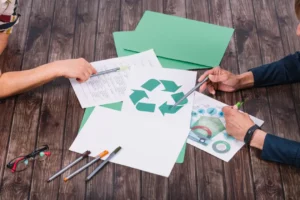Introduction
The Innovations and Developments That Will Shape the Future of Commercial Recycling
The trajectory of commercial recycling is undergoing a significant upheaval in the context of the global shift toward environmental awareness that is currently taking place. Recycling is at the forefront of sustainable practices that businesses across all sectors are working to implement, with sustainable practices generally being recognized as increasingly important. In this essay, we look into the fundamental developments and rising trends that are creating the dynamic landscape of commercial recycling. These innovations and trends are having a profound impact on the industry.
Embracing Technology as a Means of Achieving Smarter, More Automated Recycling and Waste Sorting
Efficiency in the processing of garbage is entering a brand-new era thanks to developments in technology. Automated systems that are enabled by cutting-edge sensors and cameras are able to recognize and classify a wide variety of materials with an impressive level of precision. These advances are poised to change recycling facilities all over the world by lowering the amount of contamination that occurs and increasing the value of the recyclable resources that are collected.
Data analytics and intelligent waste containers
Intelligent recycling bins that are equipped with sensors are helping to bring about a sea change in the way that waste is managed. These bins offer extremely important data insights, monitor fill levels in real time, and optimize collection routes. This strategy, which is driven by data, gives organizations the ability to fine-tune their recycling operations by making data-driven decisions that boost both efficiency and sustainability.
Creative Methods of Material Reuse and Recycling
Models of the Circular Economy
The adoption of the idea of a circular economy is catapulting the concept of sustainable development to new heights. At its core, this way of thinking places an emphasis on the minimization of waste through the design of products and materials that are intended to have prolonged lifecycles and be repurposed. Closed-loop production systems, in which materials are continuously recycled and reintroduced into the production cycle, are currently the focus of intense research and development efforts by businesses.
Reprocessing of Chemicals
The landscape of plastic recycling is about to be completely reimagined because to the advent of ground-breaking chemical recycling techniques. These technological advancements improve the quality of recycled materials while simultaneously reducing reliance on virgin resources. This is accomplished by dismantling polymers into their fundamental component parts.
Innovative and Eco-Friendly Packaging Solutions
Packaging with a Minimum of Clutter
The world of packaging is currently undergoing a profound transition toward a more minimalist aesthetic. Businesses are moving toward adopting packaging designs that are predicated on the use of less material, which ultimately results in less trash being produced. This key trend highlights the development of eco-friendly and biodegradable packaging alternatives, which is a prime example of sustainable innovation.
Packaging that is both returnable and reusable
Returnable packaging options are gaining popularity as a means of achieving higher levels of environmental sustainability. Not only does the utilization of reusable boxes and pallets help reduce waste, but it also results in cost reductions over the long term. This shift in the paradigm of packaging symbolizes a simultaneous commitment to economic prudence and environmental sustainability.
Efforts to collaborate and initiatives taken by the government
Public-Private Partnerships
It is essential for governments, businesses, and non-governmental organizations to work together in order to foster productive synergies that will propel recycling projects forward. This multifaceted approach helps fuel the construction of recycling infrastructure, which in turn generates widespread knowledge and advocacy for environmentally responsible activities.
Extended Producer Responsibility.
Extended Producer Responsibility (EPR) principles are the impetus behind a paradigm shift in the dynamics of recycling. EPR programs encourage environmentally responsible product design and provide financial incentives for collaborative recycling efforts. This is accomplished by shifting the responsibility for the disposal of products at the end of their lifecycle from consumers to the manufacturers of such products.
- Technological Advancements for Automated Waste Processing: Advanced sensors and cameras are revolutionizing recycling facilities worldwide, improving sorting accuracy, reducing contamination, and increasing the value of recyclable materials.
- Data-Driven Recycling with Intelligent Waste Containers: Smart recycling bins equipped with sensors offer real-time data insights, optimizing collection routes, enhancing efficiency, and enabling data-driven decision-making for sustainable waste management.
- Circular Economy Models and Material Reuse: The adoption of circular economy principles is reshaping sustainable development, emphasizing extended product lifecycles and material repurposing. Closed-loop production systems are gaining traction, promoting continuous material recycling.
- Innovations in Chemical Reprocessing: Revolutionary chemical recycling techniques are transforming plastic recycling, enhancing recycled material quality, and reducing dependence on virgin resources by breaking down polymers into their basic components.
- Eco-Friendly Packaging Evolution: Businesses are embracing minimalist packaging designs, using fewer materials and generating less waste. Eco-friendly and biodegradable packaging alternatives highlight sustainable innovation in the packaging industry.
- Returnable and Reusable Packaging Solutions: Returnable packaging options are on the rise, promoting environmental sustainability and long-term cost reductions. Reusable packaging aligns with economic prudence and ecological responsibility.
Conclusion
The course that is going to be taken by commercial recycling in the near future is brimming with hope and intent. The landscape is rapidly changing as a result of the confluence of innovative recycling methods, cutting-edge technology, and comprehensive collaboration, which is driving the change. Not only are companies that put recycling at the forefront of their operations and enthusiastically embrace these transformative trends paving the way toward a healthier environment, but they are also paving the way for a profound transformation in the areas of sustainability and responsible corporate citizenship. As we move forward, the development of commercial recycling is emerging as an important force that will shape a more environmentally conscious and responsible future for everyone.







